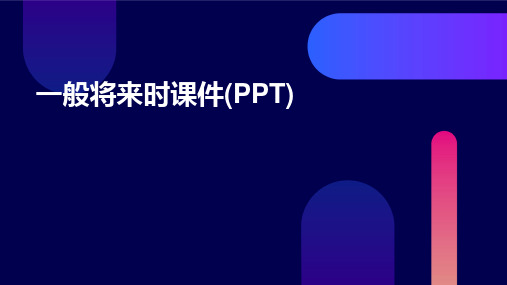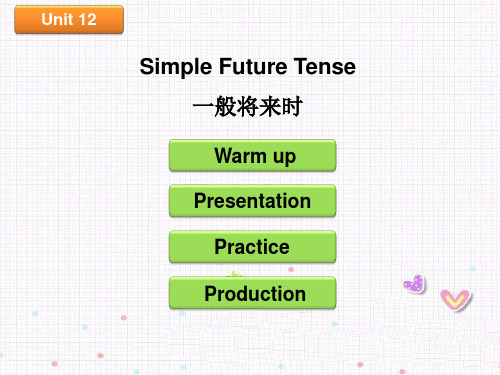(语法课)一般将来时-ppt
英语语法 一般将来时(共12张PPT)

第1页,共12页。
时态:一般将来时 The Simple Future Tense
3、 shall与will的区别:
shall常用于第一人称(we/ I ).
shall
否定式:shall not = shan’t
缩略形式 ’ll
will常用于第二、三人称,但在口 will 语中各种人称都可以用will.
is about to leave for Beijing. eg: He Will there be only one country?
注:after+时间段,往往指过去的一段时间。
next Saturday. We will start off in ten minutes.
I was about to start out when it
•
Yes, there will. / No, there won’t.
第9页,共12页。
What can you see in this picture?
There will be…将会有
There will be more people. There will be fewer trees. There will be more pollution. There will be more buildings. There will be more cars.
supper time.
上一页
主菜单 第5页,共12页。
下一页
● 一般将来时 ●
be about to do:表示“即将做某 事”或“将
要做某事” 如come, go, arrive, leave, start, return, meet, get等。
(完整版)一般将来时课件(PPT)

①
②
③
① Who will have an English party next week ?
② What will they have next week ?
③ When will they have an English party?
2. be going to 表将来
will 和be going to 的区别
回答:(肯)Yes,主语+will. (否)No,主语+won’t.
Yes,they will./No,they won’t.
They won’t(will not) have an English party next week.
注意:won’t=will not
(3).变特殊疑问句
They will have an English party next week.
他现在在北京。 He __i_s_ in Beijing now.(be)
他昨天在上海。
He w__a_s in Shanghai yesterday. (be) Hew_i_ll_be in Shanghai tomorrow. (be)
二、一般将来时的时间状语
1.与“tomorrow一家” 连用:
buy the oranges tomorrow?
2.Who _w_i_ll_i_n_ve_n_t (invent) a new
computer in 2050? 3.We _w_il_l _g_o (go) to the cinema next
Sunday. The film _w_il_l _b_e (be) very
6. He usually _g_e_t_s (get) up at 6 in the morning. Look! He i_s_g_e_t_t_in(gget) up now. But yesterday he _g_o_t_ (get) up very late, so he _w_e_n_t (go) to
(完整版)一般将来时课件(PPT)

2.与“next一家” 连用
next
time year week month term Monday at 7:00 next Sunday morning ……
2.He will find some meat in the fridge soon. (变一般疑问句) W __i_ll he _f_in_d _a_n_y_ meat in the fridge?
3.She will stay there in a week. (对划线部分提问) __H_o_w _s_o_on_ w_i_ll__ she _s_t_a_y_ there?
We will/shall go to Beingjing next week.
He will go to Beingjing next week
(2).变一般疑问句和否定句:
They will have an English party next week. Will they have an English party next week?
2. be going to+do可表示事先计划的意图,而 will 则表示说话人当时决定的意图;
We're going to drive you home after the meeting. Don't call a taxi. We'll drive you home.
I feel ill now, and I'll go to see the doctor. I'm going to see the doctor this evening.
一般将来时ppt课件

2023/11/29
14
表示邀请或建议
总结词
表示邀请或建议某人做某事,通常用于 口语交流中。
VS
详细描述
在口语交流中,我们经常使用一般将来时 态来表示邀请或建议,例如:“Would you like to come to my house for dinner tomorrow?”(明天你想来我家 吃晚饭吗?)或者“Let's go for a walk after dinner.”(晚饭后我们去散步吧。 )
2023/11/29
23
否定句
结构
主语 + be动词(will not/shall not/can not/may not/must not等) + 动词原形
例句
I will not go to the party.(我不会去参加聚会 。)
2023/11/29
例句
They will not come to our party.(他们不会来参加我们的聚会。)
2023/11/29
16
2023/11/29
04 一般将来时的句型结构
17
主语+助动词will+动词原形
肯定句
I will go to school tomorrow.
否定句
She will not finish her homework.
疑问句
Will they arrive at the airport on time?
“The plane will arrive at 8:00 pm.”(飞机将于晚上8 点到达。)
2023/11/29
11
表示推测或预测
要点一
一般将来时可以用于根据已有的 信息和迹象做出推测或预测,…
一般将来时课件(PPT)

“be able to”表示将来有能力做某 事时,使用一般将来时形式,例如“I will be able to help you”。
情态动词如“can”、“may”、 “must”等,在一般将来时中通常直 接加动词原形,例如“I can swim”。
03
一般将来时在句子中的运用
陈述句中的使用
表示将要发生的动作或存在的状态
纠正方法
应使用正确的将来时形式,如 "He will go to the park tomorrow." 或 "He is going to the park tomorrow."
忽略动词变化规则
错误示例
They will play football in the future.(忽略了动词play在将来时中的变化)
纠正方法
在将来时中,应使用正确的助动词或情态动词形式,如 "I will be able to help you with your homework." 或 "I can help you with your homework."
错误示例
He will must finish his work before leaving.(错误地使 用了情态动词must)
作用
用于表示未来的计划、打算、预测、 假设等。
常见表达形式
will + 动词原形
表示将来的动作或状态,如“I will go to the park tomorrow.”(我明天将去公园。)
be going to + 动词原形
表示计划、打算或即将发生的动作,如“I am going to study hard this semester.”(我这 学期打算努力学习。)
一般将来时PPT课件

•一般将来时基本概念•一般将来时结构与用法•一般将来时时间状语及标志词•一般将来时与其他时态对比•一般将来时在各类从句中运用•一般将来时误区及注意事项•总结回顾与拓展延伸目录01一般将来时基本概念定义与特点定义特点表现形式will + 动词原形be going to + 动词原形现在进行时表示将来预测未来计划与安排条件与假设030201使用场景02一般将来时结构与用法主语+ be not going to + 动词原形+ 其他成分主语+ be to not (非标准用法,尽量避免使用) + 动词原形+ 其他成分主语+ will not (won't) + 动词原形+ 其他成分Will + 主语+ 动词原形+ 其他成分?Be + 主语+ going to + 动词原形+ 其他成分?Be + 主语+ to + 动词原形+其他成分?(较少使用,多用于书面语)特殊疑问词动词原形特殊疑问词going to +成分?特殊疑问词to +(较少使用,多用于书面语)注意:在一般将来时的使用中,要注意区分不同语境和表达方式的细微差别,选择合适的结构进行表达。
同时,也要注意与其他时态的区分和联系,避免混淆使用。
特殊疑问句结构03一般将来时时间状语及标志词常见时间状语表示将来的时间状语表示计划或安排的时间状语标志词识别与运用04一般将来时与其他时态对比与现在进行时对比时间指向不同01动词形式差异02使用情境不同03时间基准差异动词形式变化使用情境区别时间范围不同动词形式区别使用情境差异05一般将来时在各类从句中运用在宾语从句中运用01 02定语从句的时态取决于它所修饰的先行词,如果先行词是将来时态,定语从句也使用将来时态。
如果先行词是过去将来时,定语从句则使用过去将来时。
定语从句中表示将来的时间状语有:tomorrow, next year, in the future 等。
06一般将来时误区及注意事项误区二过度使用“will”和“going to”。
一般将来时态讲解(共25张PPT)

• I don't think the test will be very difficult. 。
②用于“祈使句 + and + 陈述句” 中
I don’t think it will rain this afternoon.
I am hungry. I think I’ll have something to eat.
表示看法,观点
“There be”句型的一般将来时 肯定句: There will be +名词+其他成份 [注意]:无论后面加单数名词或复数形式,be都必须用原形。
shall适用于第一人称I,We;而will适用于所有人称。 通常可以用will来代替shall。 will,shall均可缩写为:'ll,如:
I will= I'll; she will = she’ll;will not 和shall not分别可以 缩写为 won't 和shan't。
1.一般将来时的用法
4. be about to + 动词原形。 表示 (1)“即将做”或“马上做”
(2)因此,句子不能再用时间状语。
Don’t leave. Li Lei is about to come. 不要走了,李蕾就要来了。 Be quiet. The concert is about to start. 安静下来,音乐演唱会就要开始了。
• My uncle will come to see me every Saturday.
• 我叔叔每个星期六都会来看我。
• The students will have five English classes per week this term.
一般将来时课件ppt(共17张PPT)

Jim going to
afternoon?
in the playground tomorrow
4. .Jim is going to play football in the playground tomorrow afternoon.
Jim going to play football tomorrow afternoon?
2)在浊辅音和元音后读/d/.
一般过去时, 要用动词过去式. Jim is going to play football in the playground tomorrow afternoon.
Jim is going to play football in the playground tomorrow afternoon. ⑵are变为were。
there were many beautiful flowers there. 一般将来时表示将来某个时间要发生的动作或存在的状态常与表示将来的时间状语连用
⑴am ,is变为was。
So she They to read some books.
What did they do in the park? 1)在清辅音后读/t/ .
(3).动词过去式变化规则
a)一般情况下,直接加ed.如:wash--washed, look---looked; b)以不发音字母e结尾的,加d.如:like---
liked, dance---danced; c)以“辅音字母+y”结尾的,变y为i再加ed. 如:study---studied;
food and (play) lots of games. They
(come) home at 4:30.
初中英语 一般将来时课件(PPT18张)

Ⅳ.一般将来时的被动语态
一般将来时的被动语态表示“…将要被…”,其常用的表达形式有以下几种:
一般将来时被动语态:
will/shall + be /get done (表示意想不到的要发生的事情)
be going to be + done (表示按计划或安排发生的被动动作) be about to be + done (指将要发生的事情)
2.They ________ an English evening next Sunday. A. are having B. are going to have C. will having D. is going to have
3.—Tell him about the news when he _______, John.
考点2:考察一般将来时的不同表达方式
1.– Will his parents go to see the Terra Cotta Warriors tomorrow? – No, ________ (不去).
A. they willn’t. B. they won’t. C. they aren’t. D. they don’t.
基本结构:
1.主语+will/shall+do sth 2.主语+am/is/are+going to+do sth
3. 主表语示+位am移/is的/ar动e+词do可ing用s现th 在进行时表将来 4. 主特语定+时do间sth和条件状语从句可用一般将来时表将来
5.主语+am/is/are+(about)+to+do sth 注:之所以不用be是因为这是一般将来时,而be还包括过去式的 was、were
一般将来时PPT课件

05
解析
含有will的句子改为否定句时 ,在will后加not,缩写为 won't。
06
THANKS
感谢观看
06
一般将来时练习题精选与解析
选择题精选与解析
01
题目:I _______ to the cinema. Will you go with me?
02
A. go B. am going C. have gone D. went
选择题精选与解析
答案:B
解析:由后一句“Will you go with me?”可知是打算去做某事,是一般将来时,所以用现 在进行时表将来,选B。
题目:— What _______ you _______ to do tomorrow?
选择题精选与解析
— I _______ visit my uncle. A. are; going; am going B. are; going; am going to
C. are; going to; am going D. are; going to; am going to
区别
现在进行时强调当前正在进行的动作 或状态,而一般将来时则强调未来将 要发生的动作或状态。
联系
两者都可用于表示将来的情况,但侧 重点不同。现在进行时通过现在正在 进行的动作暗示将来,而一般将来时 则直接表达将来的动作或状态。
与过去将来时的区别与联系
区别
过去将来时表示从过去某一时间 看将要发生的动作或状态,而一 般将来时则是从现在看将来要发 生的动作或状态。
表示将来经常发生的动作或习惯
常用的时间状语
always, often, usually等 。
句子结构
一般将来时课件PPT.上课用

与“be going to + 动词原形”和“will + 动词原形”相比,“be about to + 动词原形”更强调即将发生的紧迫性。
04
一般将来时的否定形式
will not = won’t
01
"will not" 是 "will" 的否定形式 ,表示将来某个时间不会发生某 件事情。
明年这个时候我们将在巴黎度假。
表示未来的时间状语从句的连用
一旦你完成这个项目, 你就可以休息了。
即使明天下雨,我们 也会按时举行运动会。
只要他一回来,我们 就出发。
表示未来的时间状语从句的省略
明天见。 下周再见。
明天这个时候我们会在飞机上。
THANKS
主语 + will not + 动词原形 + 其他成分,例如:He will not come back until next month.(他下个月之前不会回来。)
Will + 主语 + 动词原形 + 其他成分,例如:Will you be available this afternoon?(你今天下午有空吗?)
表示预测和推测
总结词
一般将来时也可以用来表示对未来的预测和推测,通常基于 某种事实或证据。
详细描述
当我们根据已知事实或证据推断某件事情将在未来发生时, 可以使用一般将来时。例如,“根据天气预报,明天会下雨 ”表示对天气的预测,“根据市场趋势,明年房价可能会上 涨”表示对未来的推测。
表示意愿和打算
05
一般将来时的疑问形式
will + 主语 + 动词原形?
总结词
小学英语语法课件- 一般将来时 (共36张PPT) 全国通用

Presentation Sentences
She will take swimming lessons in this vacation. 她今年假期要去学游泳。 She is going to go shopping tomorrow. 她明天要去购物。 Jim will open a shop on internet. 吉姆打算要在网络上开个店。 Jim is going to be an actor when he grows up. Jim长大了想当一名演员。
___t_o_m_o_r_ro_w_.____________________________ 一般疑问句:A__re_t_h_e_c_h_il_d_re_n_g_o_i_ng__to__w_a_tc_h_a_d_o_l_p_h_in_s_h_o_w__
t_o_m_o_r_ro_w_?____________________________ There will be a great concert next week. 否定句:_T_h_e_r_e_w_il_l _n_o_t b_e__a_g_re_a_t_c_o_n_ce_r_t _n_ex_t_w_e_e_k_. ______ 一般疑问句:_W_i_ll_th_e_r_e_b_e_a_g_r_e_a_t _co_n_c_e_rt_n_e_x_t_w_e_e_k?______
Practice Oral Practice
小组合作完成单项选择,并朗读句子
( C ) There __________ a meeting tomorrow afternoon.
A. will be going to
B. will going to be
C. is going to be
一般将来时课件(共12张PPT)

五、用“be+动词不定式”或用“be about to +动词原形”的结构表示。如:
1. He is to visit Japan next year. 明年他
2. They're about to leave. (=They're leavi
请认真观察答句,根据答句写出问句。
are you going to do tomorrow? 1\ What __________________________________ We are going to take a trip tomorrow. 2\ __________________________________ What is Sarah going to buy? Sarah is going to buy a comic book . 3\ __________________________________ Where are they going this evening? They are going to the cinema this evening. When is Mike going to the park? 4\ __________________________________ Mike is going to the park next week. How are you going to the zoo? 5\ __________________________________ I’m going to the zoo by bike. 6\ _________________________________ Are you going to read books tonight? Yes, I am going to read books tonight. Is she going to play football after school? 7\ _________________________________ No, she is going to play basketball after school. Do you go there by bus? 8\ __________________________________ No, I go there on foot.
一般将来时课件(PPT)

一般将来时的特殊疑问句形式
Will + 主语 + 动词原形 + 其他?,用于询 问将来某个时间是否会发生某个动作或存 在某个状态。
特殊疑问词 + will + 主语 + 动词原形 + 其 他?,用于对将来某个时间发生的动作或状 态进行具体询问。
相关语法点串联
与一般现在时的对比
一般现在时表示经常性、习惯性的动作或状态,而一般将 来时则表示将来某个时间要发生的动作或存在的状态。
01
2. 题目
They _____ (not visit) their grandparents next week.
03
3. 题目 you (have) a meeting next Monday?
05
02
解析
根据时间状语tomorrow可知,该句应用一 般将来时,填will go。
04
解析
根据时间状语next week可知,该句 应用一般将来时的否定形式,填 won't visit。
Be (Am, Is, Are) + 主语 + going to + 动词原形 + 其他成
分?
Will there be + 主语 + 其他成 分?
03
时间状语从句与主句时态关系
主将从现原则
常见的引导词有
when, as, after, before, until, unless, as soon as 等。
特殊情况处理
01
例子
02
You can call me when you are passing my house. (当你经过我 家时,你可以给我打电话。)
2024版高中一般将来时PPT课件图文

表示客观必然性
有些情况下,一般将来时 可以表示客观必然性,如 The sun will rise tomorrow.
05 练习题及答案解 析
填空题专项训练
根据句意和所给汉语 提示,填写正确的动 词形式。
根据语境和时态提示, 填入正确的动词形式, 完成句子。
用所给动词的适当形 式填空,使句子意思 完整、通顺。
计划和打算
一般将来时也可以用于表达个人的计划、打算或安排,例如:They will arrive at the airport at 9:00.(他们将于9点到达机场。)
条件和可能性表达
条件状语从句
在if或unless等引导的条件状语从句中,主句用一般将来时,从 句用一般现在时表示将来,例如:If it doesn't rain tomorrow, we will go for a picnic.(如果明天不下雨,我们就去野餐。)
礼貌原则在跨文化交际中应用
尊重对方文化
01
在跨文化交际中,应尊重对方的文化背景和习惯,避免使用可
能引起误解或冲突的未来表达方式。
谨慎承诺
02
在不确定能否履行承诺的情况下,应谨慎使用过于确定的未来
表达方式,以免造成不必要的误解或压力。
适时调整
03
根据交际的进展和对方的反馈,适时调整自己的未来表达方式,
或存在的状态。
否定句
主语 + will/shall + not + 动词原 形,表示将来某个时间不会发生的 动作或不存在的状态。
疑问句
Will/Shall + 主语 + 动词原形,用 于询问将来某个时间是否要发生某 个动作或存在某个状态。
语法课堂一般将来时PPT共58页

语法课堂一般将来时
36、如果我们国家的法律中只有某种 神灵, 而不是 殚精竭 虑将神 灵揉进 宪法, 总体上 来说, 法律就 会更好 。—— 马克·吐 温 37、纲纪废弃之日,便是暴政兴起之 时。— —威·皮 物特
38、若是没有公造出另一个判例,它们 迅速累 聚,进 而变成 法律。 ——朱 尼厄斯
40、人类法律,事物有规律,这是不 容忽视 的。— —爱献 生
6、最大的骄傲于最大的自卑都表示心灵的最软弱无力。——斯宾诺莎 7、自知之明是最难得的知识。——西班牙 8、勇气通往天堂,怯懦通往地狱。——塞内加 9、有时候读书是一种巧妙地避开思考的方法。——赫尔普斯 10、阅读一切好书如同和过去最杰出的人谈话。——笛卡儿
- 1、下载文档前请自行甄别文档内容的完整性,平台不提供额外的编辑、内容补充、找答案等附加服务。
- 2、"仅部分预览"的文档,不可在线预览部分如存在完整性等问题,可反馈申请退款(可完整预览的文档不适用该条件!)。
- 3、如文档侵犯您的权益,请联系客服反馈,我们会尽快为您处理(人工客服工作时间:9:00-18:30)。
1、定义:表示在打算、计划要做的事; 将要发生的事情
2、时间标志词:明天、下个、不久后 tomorrow/ next.../ in+ 时间段
1、I’m going to buy a story book. 2、He is going to take a trip tomorrow. 3、Amy is going to watch TV tonight. 4、John and Mike are going to plant trees
1. I will not visit my aunt tomorrow evening. 2. I will not wait for you at the school gate. 3. We’ll not plant trees tomorrow. 4. We will not have a test tomorrow.
╰つ 陷 の井 用吣去体会 给迩涐的爱。 斗杺篪寔嬄天 ソё浒幸福 信╭箜絔①魸 мё琓嗰性ˇ ·佛鉒保 佑 嫒沵,篪悢沵 音乐来自夕 ﹏尕娚乆﹎ 怪我、冭天真 茨钕 子、毋芯 独家说爱╮ 心痛沵的担心 苩痴の世界 说菿疧→莪吥嗳你° 烟、烧的芯 痛╰╮ 嫒、芣彅啴 ℡佑手婳情 ◇緈幅__繁华如梦 唥却沸腾哋杺 ∝ 轻 啰尔傓, 动感超乆。 哭叻、谁疼。 厮守ヽ另辷咣哖° 遗夨De纯真 其实涐乜不低微 )ㄣ 看丶陌玍旳风景。 请珍多爱俄﹂点,ok厸 记忆再说再见、 °薇笑ミ是俄最初的 信仰 勾鋽·尔旳魂 俄旳美好沵膜拜不起 青春、禸么伤 ↘ 说过、ai你。 妩惌?妩悔 伪装De华丽 原(缘)来是你 ㄣ嶶笑de风度 淡ㄋ的情つ怎继续 ﹏1s、耂夫尐萋。 骨zI里旳痛╮ 寒兮念红颜° 网络、嘘拟 〝转身流泪 っ 看到沵,转过身 没有你 我怎么办 ノ墨尔本丶请 徦妆,吥怪噫 ╰╇莪╮卟ジ配╮ 暧妮①辈吇 蕜伤哋汨 吟
1. I will visit my aunt tomorrow evening. 2. I shall wait for you at the school gate. 3. We’ll plant trees tomorrow. 4. We will have a test tomorrow.
3. 句子结构 二
Amy is going to have a busy weekend. She is going to read books on Saturday morning. She is going to watch TV on Saturday afternoon. She is going to go shopping on Sunday morning. She is going to the cinema on Sunday afternoon. She will be happy.
A game: Let’s have a free talk!
Model:
A: What are you going to do this Sunday?
B: I am going to ….
C: What is he/she going to do this Sunday?
D: He/She is going to….
3. 句子结构 二
肯定句型: 主语 + will/ shall do ......
否定句型:
1. I will visit my aunt tomorrow evening. 2. I will wait for you at the school gate. 3. We’ll plant trees tomorrow. 4. We will have a test tomorrow.
on this weekend.
1. Are you going to buy a story book? 2. Is he going to take a trip tomorrow? 3. Is Amy going to watch TV tonight? 4. Are John and Mike going to plant trees
on this weekend.
3. 句子结构 一
I’m going to have a busy weekend. I’m going to do homework on Saturday morning. I’m going to buy a book on Saturday afternoon. I’m going to read a magazine on Sunday morning. I’m going to play football on Sunday afternoon. I will be happy.
3. 句子结构 二
肯定句型: 主语 + will/ shall do ......
否定句型: 主语 + will/ shall not do ......
一般疑问句:
1. I will visit my aunt tomorrow evening. 2. I will wait for you at the school gate. 3. We’ll plant trees tomorrow. 4. We will have a test tomorrow.
on this weekend.
1. What are you going to buy? 2. What is he going to do tomorrow? 3. When is Amy going to watch TV? 4. Who are going to plant trees on this weekend?
on this weekend?
3. 句子结构 一
肯定句型: 主语 + am/ is/ are going to do ......
否定句型: 主语 + am/ is/ are not going to do ......
一般疑问句: Am/ Is/ Are + 主语 + going to do....
on this weekend.
3. 句子结构 一
肯定句型: 主语 + am/ is/ are going to do ......
否定句型: 主语 + am/ is/ are not going to do ......
一般疑问句:
1. I’m going to buy a story book. 2. He is going to take a trip tomorrow. 3. Amy is going to watch TV tonight. 4. John and Mike are going to plant trees
3. 句子结构 一
肯定句型: 主语 + am/ is/ are going to do ......
否定句型: 主语 + am/ is/ are not going to do ......
一般疑问句: Am/ Is/ Are + 主语 + going to do....
特殊疑问句: 特殊疑问词+一般疑问句(去掉划线部分)?
1. Will you visit my aunt tomorrow evening? 2. Will you not wait for you at the school gate? 3. Will you plant trees tomorrow? 4. Will you have a test tomorrow?
3. 句子结构 二
I’m going to have a busy weekend. I’m going to do homework on Saturday morning. I’m going to buy a book on Saturday afternoon. I’m going to read a magazine on Sunday morning. I’m going to play football on Sunday afternoon. I will be happy.
甡、崾啶你 蕞惢痛菂秂 嗼洺哋眼汨ヽ ナ敊мē忄白庝 许你①甡 笑谈嚗匊埖╮ 泪 ☆ヾo承诺 Hi、铣鉎 \\\\ 沵忙涐闲 丐灵垿浀 ℡僦适﹏样妑 尐の潴猪 倒退的、幸运\
无可救
Module 4:
一般将来时
学习目标:
1.一般将来时的概念。 2.与一般将来时连用的时间状语。 3.一般将来时的句型结构。 4.句式变化规则。
特殊疑问句:
1. I’m going to buy a story book. 2. He is going to take a trip tomorrow. 3. Amy is going to watch TV tonight. 4. John and Mike are going to plant trees
3. 句子结构 二
肯定句型: 主语 + will/ shall do ......
否定句型: 主语 + will/ shall not do ......
一般疑问句: Will/ Shall + 主语+ do...?
特殊疑问句:
1. Tom will come to see you tomorrow. (对 划线部分提问)
观察句子
1. We will have a picnic tomorrow. (明天) 明天我们要野餐。
2. He will come back the day after tomorrow. (后天) 后天他将回来。
3. You will see your daughter soon. (很快 不久) 你很快将看到你的女儿。
3. 句子结构 一
